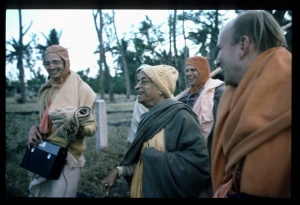CC Adi 11.50: Difference between revisions
m (1 revision(s)) |
No edit summary |
||
| Line 1: | Line 1: | ||
{{ | [[Category:Sri Caitanya-caritamrta - Adi-lila Chapter 11|C050]] | ||
<div style="float:left">'''[[Sri Caitanya-caritamrta|Śrī Caitanya-caritāmṛta]] - [[CC Adi|Ādi-līlā]] - [[CC Adi 11|Chapter 11: The Expansions of Lord Nityānanda]]'''</div> | |||
<div style="float:right">[[File:Go-previous.png|link=CC Adi 11.49|Ādi-līlā 11.49]] '''[[CC Adi 11.49|Ādi-līlā 11.49]] - [[CC Adi 11.51|Ādi-līlā 11.51]]''' [[File:Go-next.png|link=CC Adi 11.51|Ādi-līlā 11.51]]</div> | |||
{{CompareVersions|CC|Adi 11.50|CC 1975|CC 1996}} | |||
{{RandomImage}} | |||
==== TEXT 50 ==== | ==== TEXT 50 ==== | ||
<div | <div class="verse"> | ||
vasanta, navanī hoḍa, gopāla, sanātana | :vasanta, navanī hoḍa, gopāla, sanātana | ||
viṣṇāi hājarā, kṛṣṇānanda, sulocana | :viṣṇāi hājarā, kṛṣṇānanda, sulocana | ||
</div> | </div> | ||
| Line 12: | Line 16: | ||
==== SYNONYMS ==== | ==== SYNONYMS ==== | ||
<div | <div class="synonyms"> | ||
''vasanta''—Vasanta; ''navanī hoḍa''—Navanī Hoḍa; ''gopāla''—Gopāla; ''sanātana''—Sanātana; ''viṣṇāi hājarā''—Viṣṇāi Hājarā; ''kṛṣṇānanda''—Kṛṣṇānanda; ''sulocana''—Sulocana. | |||
</div> | </div> | ||
| Line 19: | Line 23: | ||
==== TRANSLATION ==== | ==== TRANSLATION ==== | ||
<div | <div class="translation"> | ||
Vasanta was the fifty-first, Navanī Hoḍa the fifty-second, Gopāla the fifty-third, Sanātana the fifty-fourth, Viṣṇāi the fifty-fifth, Kṛṣṇānanda the fifty-sixth and Sulocana the fifty-seventh. | Vasanta was the fifty-first, Navanī Hoḍa the fifty-second, Gopāla the fifty-third, Sanātana the fifty-fourth, Viṣṇāi the fifty-fifth, Kṛṣṇānanda the fifty-sixth and Sulocana the fifty-seventh. | ||
</div> | </div> | ||
| Line 26: | Line 30: | ||
==== PURPORT ==== | ==== PURPORT ==== | ||
<div | <div class="purport"> | ||
Śrīla Bhaktisiddhānta Sarasvatī Ṭhākura writes in his Anubhāṣya, “Navanī Hoḍa appears to have been the same person as Hoḍa Kṛṣṇadāsa, the son of the King of Baḍagāchi. His father’s name was Hari Hoḍa. One can visit Baḍagāchi by taking the Lālagolā-ghāṭa railway line. Formerly the Ganges flowed by Baḍagāchi, but now it has become a canal known as the Kālśira Khāla. Near the Muḍāgāchā station is a village known as Śāligrāma in which King Kṛṣṇadāsa arranged for the marriage of Śrī Nityānanda Prabhu, as described in the Bhakti-ratnākara (Twelfth Wave). It is sometimes said that Navanī Hoḍa was the son of Rāja Kṛṣṇadāsa. His descendants still live in Rukuṇapura, a village near Bahiragāchi. They belong to the dakṣiṇa-rāḍhīya-kāyastha community, but, having been reformed as brāhmaṇas, they still initiate all classes of men.” | Śrīla Bhaktisiddhānta Sarasvatī Ṭhākura writes in his ''Anubhāṣya'', “Navanī Hoḍa appears to have been the same person as Hoḍa Kṛṣṇadāsa, the son of the King of Baḍagāchi. His father’s name was Hari Hoḍa. One can visit Baḍagāchi by taking the Lālagolā-ghāṭa railway line. Formerly the Ganges flowed by Baḍagāchi, but now it has become a canal known as the Kālśira Khāla. Near the Muḍāgāchā station is a village known as Śāligrāma in which King Kṛṣṇadāsa arranged for the marriage of Śrī Nityānanda Prabhu, as described in the ''Bhakti-ratnākara'' (Twelfth Wave). It is sometimes said that Navanī Hoḍa was the son of Rāja Kṛṣṇadāsa. His descendants still live in Rukuṇapura, a village near Bahiragāchi. They belong to the ''dakṣiṇa-rāḍhīya-kāyastha'' community, but, having been reformed as ''brāhmaṇas'', they still initiate all classes of men.” | ||
</div> | </div> | ||
__NOTOC__ | |||
<div style="float:right; clear:both;">[[File:Go-previous.png|link=CC Adi 11.49|Ādi-līlā 11.49]] '''[[CC Adi 11.49|Ādi-līlā 11.49]] - [[CC Adi 11.51|Ādi-līlā 11.51]]''' [[File:Go-next.png|link=CC Adi 11.51|Ādi-līlā 11.51]]</div> | |||
__NOTOC__ | |||
__NOEDITSECTION__ | |||
Revision as of 06:17, 22 July 2021

A.C. Bhaktivedanta Swami Prabhupada
TEXT 50
- vasanta, navanī hoḍa, gopāla, sanātana
- viṣṇāi hājarā, kṛṣṇānanda, sulocana
SYNONYMS
vasanta—Vasanta; navanī hoḍa—Navanī Hoḍa; gopāla—Gopāla; sanātana—Sanātana; viṣṇāi hājarā—Viṣṇāi Hājarā; kṛṣṇānanda—Kṛṣṇānanda; sulocana—Sulocana.
TRANSLATION
Vasanta was the fifty-first, Navanī Hoḍa the fifty-second, Gopāla the fifty-third, Sanātana the fifty-fourth, Viṣṇāi the fifty-fifth, Kṛṣṇānanda the fifty-sixth and Sulocana the fifty-seventh.
PURPORT
Śrīla Bhaktisiddhānta Sarasvatī Ṭhākura writes in his Anubhāṣya, “Navanī Hoḍa appears to have been the same person as Hoḍa Kṛṣṇadāsa, the son of the King of Baḍagāchi. His father’s name was Hari Hoḍa. One can visit Baḍagāchi by taking the Lālagolā-ghāṭa railway line. Formerly the Ganges flowed by Baḍagāchi, but now it has become a canal known as the Kālśira Khāla. Near the Muḍāgāchā station is a village known as Śāligrāma in which King Kṛṣṇadāsa arranged for the marriage of Śrī Nityānanda Prabhu, as described in the Bhakti-ratnākara (Twelfth Wave). It is sometimes said that Navanī Hoḍa was the son of Rāja Kṛṣṇadāsa. His descendants still live in Rukuṇapura, a village near Bahiragāchi. They belong to the dakṣiṇa-rāḍhīya-kāyastha community, but, having been reformed as brāhmaṇas, they still initiate all classes of men.”